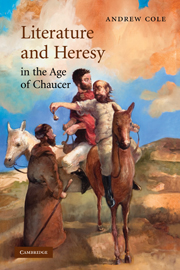Book contents
- Frontmatter
- Contents
- Preface
- Acknowledgments
- List of abbreviations
- PART I THE INVENTION OF HERESY
- PART II THE LATE FOURTEENTH CENTURY: CANONIZING WYCLIFFISM
- PART III THE EARLY FIFTEENTH CENTURY: HERETICS AND EUCHARISTS
- 5 Thomas Hoccleve's heretics
- 6 John Lydgate's eucharists
- PART IV FEELING WYCLIFFITE
- PART V EPILOGUE
- Notes
- Bibliography
- Index of manuscripts cited
- General index
- CAMBRIDGE STUDIES IN MEDIEVAL LITERATURE
6 - John Lydgate's eucharists
Published online by Cambridge University Press: 22 September 2009
- Frontmatter
- Contents
- Preface
- Acknowledgments
- List of abbreviations
- PART I THE INVENTION OF HERESY
- PART II THE LATE FOURTEENTH CENTURY: CANONIZING WYCLIFFISM
- PART III THE EARLY FIFTEENTH CENTURY: HERETICS AND EUCHARISTS
- 5 Thomas Hoccleve's heretics
- 6 John Lydgate's eucharists
- PART IV FEELING WYCLIFFITE
- PART V EPILOGUE
- Notes
- Bibliography
- Index of manuscripts cited
- General index
- CAMBRIDGE STUDIES IN MEDIEVAL LITERATURE
Summary
I am using what is almost street language to reveal the mysteries of the scriptures.
JeromeA book on heresy in the fourteenth and fifteenth centuries would be incomplete without a consideration of two items: the eucharist – the focal point of so much religious controversy in the late medieval period – and John Lydgate, the most prolific poet of the era. And what a powerhouse of religious verse he was, able to write poems, prayers, legends, invocations, and ballads at the drop of a hat for a variety of audiences and devout occasions. If any poet were the paragon of both orthodoxy and its sub-speciality, anti-Wycliffism, it would be this one.
One would think. Before we go any further in assessing Lydgate's ideas about the eucharist in the context of the religious controversies centered around Wycliffism, we can be clear that Lydgate is plainly no anti-Wycliffite, never indulges in the kind of polemic that characterizes the efforts of his religious contemporaries, Roger Dymmok or Thomas Netter, both of whom produce works in the service of church and state. And where Lydgate does take firm anti-Wycliffite positions, it is in the name of others who have already shown themselves to be champions of orthodoxy – namely, Henry V and Henry VI.
- Type
- Chapter
- Information
- Literature and Heresy in the Age of Chaucer , pp. 131 - 152Publisher: Cambridge University PressPrint publication year: 2008

